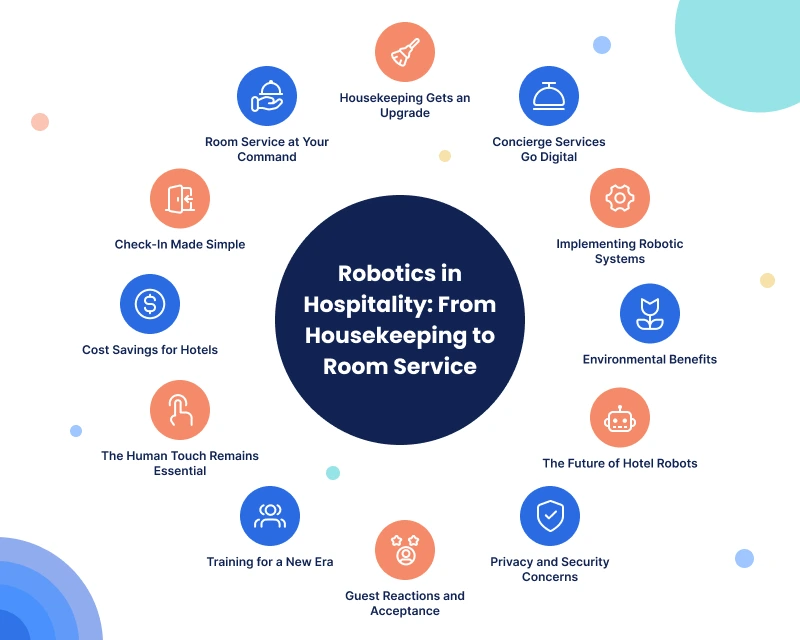The hospitality industry is changing fast with new technology that is making hotels smarter. Robots are now helping staff in many areas, making stays more efficient and enjoyable for guests.

How Robots Are Changing Hotels
Robots as assistants are becoming a common sight in hotels across the world. They clean the rooms, deliver items to guests, and even check in guests at the front desk.
These machines collaborate with humans for routine tasks, enabling the hotel staff to give personalized attention to guests and deal with more complex tasks
Housekeeping Gets an Upgrade
Now, cleaning robots can vacuum hallways and sanitize rooms without any humans in attendance.
They can avoid touching furniture thanks to their sensors and can work throughout the night when their guests are sleeping.
Some advanced models can change sheets and towels even with special arms. All this serves to keep hotel rooms ever so clean, yet light on the supply.
Room Service at Your Command
Delivery robots bring food, drinks, and items directly to guest rooms. They can ride elevators, navigate hallways, and call guests to announce their arrival.
They keep food hot and drinks cold and provide entertainment for guests who enjoy the novelty of getting room service from a robot.
Check-In Made Simple
Robot receptionists can now handle guest check-ins without human help. They scan passports, verify bookings, and create room keys in minutes.
This tech speeds up the wait around during busy hours. The guests really value accessing their rooms faster after a hectic kind of travel day.
Concierge Services Go Digital
Robot concierges help guests find local attractions and make reservations. They speak multiple languages and can answer common questions about the hotel.
The intelligence inherent to these machines will always remind the guest about the preferences they usually use in the future. Thus, personalizing the experience and making guests feel valuable.
Behind-the-Scenes Efficiency
Many hotels use robots for jobs guests never see. Laundry robots fold sheets and towels with perfect precision.
The supply robots are entrusted with the task of moving goods from the warehouse to guest rooms. By this, they lessen the physical burden on human coworkers and increase the efficiency of operations.
Cost Savings for Hotels
While robots require a big investment up front, they save money over time. They don’t need breaks, sick days, or overtime pay.
Hotels can redirect these savings into better amenities or lower rates. This helps them stay competitive in a crowded market.
The Human Touch Remains Essential
Even with robots, hospitality still needs the human element. Robots can’t show real empathy or solve unexpected problems creatively.
The best hotels use robots for routine work but keep people for meaningful interactions. This balance creates the ideal guest experience.
Training for a New Era
Hotel staff now need new skills to work with robot coworkers. They learn to program, maintain, and supervise these high-tech helpers.
This creates better job opportunities in the industry. Workers can focus on more skilled tasks instead of routine labor.
Guest Reactions and Acceptance
Most guests enjoy interacting with hotel robots. Children especially find them fascinating and fun to watch.
Older guests sometimes need help getting comfortable with the technology. Hotels that introduce robots gradually see better acceptance rates.
Privacy and Security Concerns
Robot systems gather data about guests and their preferences. Hotels must protect this information carefully to maintain trust.
Clear policies about what data robots collect help ease guest concerns. The best hotels are transparent about their robot systems.
The Future of Hotel Robots
New robots are becoming more advanced each year. Soon they’ll recognize guests’ faces and anticipate their needs based on past stays.
Virtual reality features may allow remote check-ins with robot assistance. The possibilities for enhancing guest experiences continue to expand.
Environmental Benefits
Robot helpers can reduce hotel waste significantly. They use exact amounts of cleaning supplies and track inventory precisely.
Energy-efficient models help hotels lower their carbon footprint. This appeals to eco-conscious travelers who choose green accommodations.
Implementing Robotic Systems
Hotels must plan carefully when adding robots to their staff. The process requires training, testing, and adjusting systems to fit each property.
Starting small with one or two robot types works best. Hotels can then expand their robot workforce as staff and guests adapt.
Conclusion
Robots are transforming hospitality in ways that benefit both hotels and guests. They handle routine tasks while allowing human staff to provide meaningful service.
The future will likely bring even more innovation in this area. Hotels that embrace these changes thoughtfully will lead the industry forward.
Get in touch
If you’re ready to elevate your hotel’s operations or have any questions, QloApps is here to assist!
Let’s collaborate to streamline your processes and enhance guest satisfaction.
Discover how QloApps’ Property Management System and Channel Manager solutions can simplify your operations and boost your revenue. Get in touch now!
Be the first to comment.